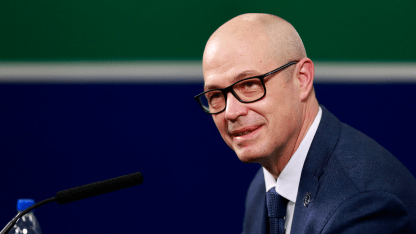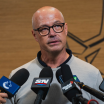A team’s identity doesn’t change overnight.
You don’t just snap your fingers and immediately become tough to play against.
And it’s not as simple as competing on every shift, getting pucks in deep, and playing fast.
A team’s identity comes from individual sacrifices for the team’s greater good. It comes from personal stats offered up in exchange for a chance at points in the standings.
An identity is hard to obtain and even harder to keep.
That’s what this Vancouver Canucks team is trying to accomplish. A winning culture.
Habits, predictability, effort, structure, and details are all words that you’ll often hear from head coach Rick Tocchet about ‘Canucks hockey’. There’s an attention to detail from the ice to the front office that is creating a new culture around Rogers Arena.
After some difficult years in the history of the franchise, the team is starting to turn the corner with the contributions of a new coaching staff as well as a full buy-in from any player who puts on a Canucks jersey. After much of the core remained the same, the players needed something to come together on and that message has been delivered loud and clear in the form of setting a new culture and building a new brand of Canucks hockey.
“I think it's very demanding,” said General Manager Patrik Allvin when asked about changing the culture in the organization. “It's easy to say you're tired of losing but are you willing to invest? There’s a reason why invest is one of our words in the dressing room. Are you ready to invest in yourself to play the right way every single night for eighty-two games? Because it’s hard. It's mentally hard.”
Allvin has high standards for his group. From his management staff, down to his coaches and from there on to his players. Canucks hockey is a demanding style of play.
“This is a partnership between ownership, management, coaches and the players,” said Allvin. “We want to be invested, committed, focused, and that’s hard but that’s also what it takes to be a good team night in and night out. Setting a new tone and working towards it will definitely take some time.”
There’s plenty of time being put in on the ice at practice by the coaching staff, which has a whopping 6,235 games played in the NHL. There’s plenty of winning that has been done by this staff; Adam Foote and Sergei Gonchar each won the Stanley Cup as players, and Mike Yeo won as an assistant coach. Then, there’s Rick Tocchet, who has won as both a player and a coach. Oh, and the Sedins are Hall of Famers too.
“I believe in the autonomy of giving your coaches projects or being creative with their ideas,” said Head Coach Rick Tocchet. “There are no egos here. I'm the head coach, but I don't wear a head coaching badge. Yes, I'm the head coach and they respect that, but we all know that the entire staff has a lot of say here.”
When Tocchet was hired, one of the first changes he made was getting a bigger office. The head coach wanted to be able to have his whole staff gather in a space where ideas could flow. Now, there’s a Head Coach’s office with a table for 12 in which the group meets at nearly every day.
Tocchet's office is where ideas are formed, and check-ins take place daily. Whether if it’s a development coach looking to get some one-on-one time with a player or a video coach bringing an idea to the group – Tocchet's office is a space where all of the coaches are comfortable sharing their thoughts on how the team can improve.
There is trust in the head coach from management and it’s not just about the hockey part of his mind.
“It's a very dynamic group for sure but there are no egos and Rick wants open-table discussions,” said Allvin. “Everything starts with Rick Tocchet and how exceptional he is with his communication skills. He’s not afraid to delegate and he’s not looking to be the smartest guy in the room. It’s great to see his ability to delegate and include all the coaches to run drills and practices while also having other responsibilities. That’s just the growth of this organization."
Allvin spent much of the coaching staff recruitment process making sure that each person was committed to changing the culture and taking on the challenge of creating a new brand of Canucks hockey.
“There's a lot of repetition for the coaches to get the players to play the way they want.” added Allvin.
With a solid start to the season, Allvin believes that the right pieces are now in place to keep this sustainable. There will be slumps and streaks but there’s a lot of belief in this group of players as long as the team sticks to continuing to put in the work.
“We always strive for excellence. We will never be satisfied. We will always need to be better. That’s our challenge because the day you are satisfied, you are done for.”
This team is still a work in progress but Allvin is happy to see that the players are buying in and seeing how their buy-in can translate to wins. There’s value in two points in the standings but because this group isn’t a finished product, the process is as important as the short-term results.
Allvin knows he has the staff to manage the highs and lows of the season. Whether that’s Adam Foote working on decision-making with the defencemen, Daniel and Henrik Sedin putting out fires with the players before a full-on blaze, or Ian Clark getting extra time in with Thatcher Demko or Casey DeSmith -- the coaches are working together as one to get the best out of their group on the ice.
“During the course of a long year, you will see the ups and downs and you want to see how the coaches handle things,” said Allvin. “Then, you want to see how the players react to that and we hit the reset button. It wasn't a perfect game against New Jersey but credit to the coaches and the players. We took a step back and got back to teaching. We have played a pretty good two games here and now we're going to just continue to focus on the next game to see if we can build on that.”
One of the things that Allvin wants from his management group is synchronicity. He believes when you are part of a successful franchise, you feel pieces of every area because you have that high standard surrounding you. It’s about holding your peers to high expectations and that challenge is the same on the ice as well as off the ice to fit into being a part of Canucks hockey.
Canucks hockey lives at Rogers Arena but is also easy to spot in Abbotsford and throughout their prospect pipeline around the world. The organization made a commitment to their prospects with the addition of international development coaches and bringing in a highly touted young coach in Abbotsford with Jeremy Colliton.
With the AHL team so close to the NHL club, the two coaching staffs can work together in preparing players to be ready to play for the Vancouver Canucks and not skip a beat during the transition.
Allvin credits his professional scouting staff for working together to be able to find players like Nils Åman and Dakota Joshua. Players who his staff believed could be effective in different roles under the Canucks brand of hockey in 2023-24.
The GM reminisced on his time winning two Stanley Cups with the Pittsburgh Penguins and feels that an organization needs to be fully committed to making daily improvements.
“It's a never-ending,” said Allvin with a laugh. “We just need to get better all the time. I think that's where my job is to push the coaches and then it’s the coaches’ job is to push the players.”
Right now, the players are pushing. Setting a new tone takes time, sacrifice and accountability. They are pushing to create a winning culture and the organization is making an effort to surround the players with the right pieces to assist in the players’ improvement and development.
From the salary cap specialists to the scouting staff and the development coaches to the players -- everyone is committed to the same buy-in and willingness to make sacrifices.
This organization is demanding, and the players have bought into what the coaching staff is preaching.
Unselfishness through sacrifices, a commitment to excellence, and an investment in doing things right every single day.
That’s what Allvin is looking for.
That’s Canucks hockey.



















